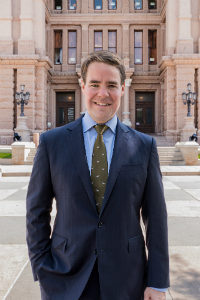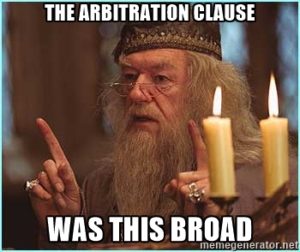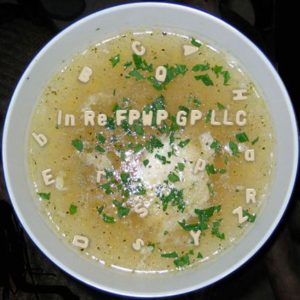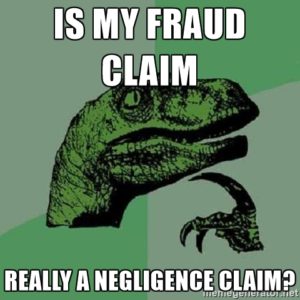In In re FPWP GP LLC, et al. (January 25, 2017), the Dallas Court of Appeals conditionally granted a writ of mandamus for the district court’s failure to transfer venue under the mandatory venue provision of Section 65.023 of the Civil Practice & Remedies Code, which provides that “a writ of injunction against a party who is a resident of this state shall be tried in … the county in which the party is domiciled.” Courts have struggled at times to apply Section 65.023 because it does not apply to all suits seeking an injunction, but instead only to suits in which the relief requested is “purely or primarily injunctive.” So, if the primary form of relief is something else, e.g. damages, then the mandatory venue provision does not apply. The opinion gave examples of the exception, such as when injunctive relief is simply to maintain the status quo pending litigation or when there is no request for a permanent injunction. But in the case at hand, the plaintiff sought only a declaratory judgment that was effectively a mirror image of the permanent injunctive relief requested. Holding the injunction “was a means to the same end” as the declaratory judgment, the Court held that the primary purpose of the lawsuit was injunctive and that transfer to the county of domicile of the defendants was mandatory under Section 65.023.
Monthly Archives: January 2017
When is a fraud claim subject to a 2-year limitations period? When it’s not a fraud claim.
January 25, 2017In Parsons v. Queenan, et al., No. 05-15-01375-CV (January 23, 2017), the Dallas Court of Appeals affirmed summary judgment in favor of the defendants on limitations grounds. The suit was Parsons’ third in a series of malpractice suits against different attorneys that represented him since the death of his wife in a plane crash more than two decades earlier.
The first issue was whether the breach of fiduciary duty and fraud claims were subject to a 2-year statute of limitations for negligence or a 4-year statute of limitations for fraud or breach of fiduciary duty. The Dallas Court held that the 2-year limitations period applied under the anti-fracturing rule, which prevents legal malpractice plaintiffs from “opportunistically transforming a claim that sounds only in negligence into other claims” to avail themselves of longer limitations periods, less onerous proof requirements, or other tactical advantages. For the anti-fracturing rule to apply, the gravamen of the complaint must focus on the quality or adequacy of the attorney’s representation. The Dallas Court concluded that the fraud and breach of fiduciary duty claims asserted by Parsons were claims for professional negligence as a matter of law.
In the second issue, the Dallas Court held that the 2-year limitations period began to run on the date of the denial of the motion for reconsideration by the Texas Supreme Court in the underlying litigation, not the date mandate was issued. Under Hughes v. Mahaney & Higgins, 821 S.W.2d 154 (Tex. 1991), “the statute of limitations on the malpractice claim against the attorney is tolled until all appeals on the underlying claim are exhausted.” Id. at 157. The Dallas Court held that appeals are exhausted when a motion for rehearing with the Texas Supreme Court is denied because that is the last action of right that can be taken in the underlying case.
Parsons v. Queenan, et al., No. 05-15-01375-CV (January 23, 2017)
 Appeals from forcible entry and detainer actions are common and we do not ordinarily report on them, but it has been some time since we last noted a summary of key principles. A good one appears in the recent case of McCall v. Fannie Mae, in which the appellant alleged improprieties about the relevant foreclosure sale. “But,” noted the Fifth Court, “the deed of trust expressly created a landlord and tenant-at-sufferance relationship when the property was sold by foreclosure. This provided an independent basis to determine the issue of immediate possession without resolving the issue of title. As we have explained, any defects in the foreclosure process . . . may be pursued in a suit for wrongful foreclosure or to set aside the substitute trustee’s deed, but they are not relevant in this forcible detainer action.” No. 05-16-00010-CV (Jan. 20, 2017) (mem. op.)
Appeals from forcible entry and detainer actions are common and we do not ordinarily report on them, but it has been some time since we last noted a summary of key principles. A good one appears in the recent case of McCall v. Fannie Mae, in which the appellant alleged improprieties about the relevant foreclosure sale. “But,” noted the Fifth Court, “the deed of trust expressly created a landlord and tenant-at-sufferance relationship when the property was sold by foreclosure. This provided an independent basis to determine the issue of immediate possession without resolving the issue of title. As we have explained, any defects in the foreclosure process . . . may be pursued in a suit for wrongful foreclosure or to set aside the substitute trustee’s deed, but they are not relevant in this forcible detainer action.” No. 05-16-00010-CV (Jan. 20, 2017) (mem. op.)
Claims to stop payment to Paxton prosecutors moot and still not ripe—no jurisdiction.
January 19, 2017The Dallas Court of Appeals was pulled into one of the wide-ranging disputes concerning the prosecution of Texas Attorney General Ken Paxton, this one concerning the payment of private attorneys appointed to prosecute Paxton. The Dallas Court determined that it lacked jurisdiction because the claims were moot and were not yet ripe.
Attorneys were appointed to prosecute Paxton after the Collin County Criminal District Attorney recused his office. The appointed attorneys were to be paid $300 per hour, which was more than fixed $1000 for most court appointed attorneys for indigent defendants under the Collin County local rules, which also apply to appointed prosecutors. However, the local rules also provided “Payment can vary from the fee schedule in unusual circumstances or where the fee would be manifestly inappropriate because of circumstances beyond the control of the appointed counsel.”
On December 11, 2015, the appointed prosecutors sought an interim payment of $254,908.85 from Collin County. Three weeks later, Collin County taxpayer Jeffory Blackard sued seeking a temporary restraining order and injunction preventing payment, asserting that as a taxpayer he had standing to seek to enforce the local rules fixing most fees at a flat $1000. The Collin County judge recused himself, and the taxpayer suit was assigned to County Court at Law No. 5 in Dallas County.
A week after Blackard filed his taxpayer suit, the presiding judge over the criminal prosecution, a Tarrant County judge, approved the payment of the request for interim fees and ordered that the fees be presented to the Collin County Commissioner’s Court for payment. The next day, Blackard filed a supplemental application for temporary restraining order in the Dallas County taxpayer suit, which was denied one day later. Three days after that, only one month after the initial request for interim fees was made, the Collin County Commissioners Court voted to pay. Blackard then filed an amended petition seeking injunctive relief preventing any future requests for attorney’s fees by the appointed prosecutors. The County Court at Law determined that it lacked jurisdiction and granted the defendants’ pleas to the jurisdiction. Blackard appealed.
The Dallas Court began its analysis by noting that mootness and ripeness are threshold issues that implicate subject matter jurisdiction. Rendering opinions under either circumstance violates the prohibition against rendering advisory opinions because such cases present no justiciable controversy.
The Dallas Court held that Blackard’s claims relating to the interim fees were moot because the fees had already been paid and, under Texas law, taxpayers have standing only to seek to enjoin future payments, not to recover funds that have already been paid. Blackard asserted on appeal that his claims fell within the exception to mootness for claims “capable of repetition, yet evading review” because the appointed attorneys stipulated that they anticipated submitting future invoices. But the Dallas Court rejected that exception, which “applies only in rare circumstances.” It noted that the exception had previously only been used to challenge unconstitutional acts performed by the government, and held that the process by which fees would be requested in the future provided sufficient time for Blackard to seek judicial review prior to payment, pointing to the month between the initial request for interim fees and payment.
In addition, the Dallas Court held that claims relating to future invoices were not yet ripe. While it was stipulated that additional fees would be requested, it was not stipulated that the additional requests would be for $300 an hour or otherwise would be inconsistent with the Collin County fee schedule. So the Dallas Court concluded there was no live controversy concerning future requests for fees.
In the common fact situation of an employee leaving for a new, competing employer, the Fifth Court found no abuse of discretion in denying a temporary injunction when:
- After his termination, Turner did not have access to any confidential information except for the contents of a laptop
- Turner testified that he did not access the laptop following his termination except to examine his girlfriend’s resume and his employment agreement and when he took it to the Apple Store to have his personal photographs removed from the computer.
- Plaintiff had a forensic examination of the computer performed, and it presented no evidence that Turner’s testimony was false.
- When Turner also testified that when he went to work for Gulfstream, he did not contact any of BM Medical’s clients with whom he had worked while employed by BM Medical (although some contacted him to find out what had happened to him); and
- Only one client of BM Medical became a client of Gulfstream, who was a good friend of Turner’s whom Turner had known before he went to work for BM Medical, and who still did business with BM Medical.
BM Medical Management Service LLC v. Turner, No. 05-16-00670-CV (Jan. 10, 2017) (mem. op.)
 The first ever Bench-Bar conference for the Northern District of Texas will be held on January 27 at the Four Seasons in Las Colinas. Here is the schedule and registration information; it looks to be a great program and the beginning of a strong tradition.
The first ever Bench-Bar conference for the Northern District of Texas will be held on January 27 at the Four Seasons in Las Colinas. Here is the schedule and registration information; it looks to be a great program and the beginning of a strong tradition.
 Governor Abbott has appointed Dallas attorney Jason Boatright to the vacancy on the Fifth Court; more information is available in the official press release.
Governor Abbott has appointed Dallas attorney Jason Boatright to the vacancy on the Fifth Court; more information is available in the official press release.
Enxeco Inc. v. Staley reversed a dismissal for want of prosecution, observing: “[T]he rules of judicial administration provide that civil non-jury cases should be brought to trial or final disposition within twelve months from the defendant’s appearance date. The administrative rules expressly recognize, however, that in complex cases or special circumstances ‘it may not be possible to adhere to these standards.'” (citations omitted). Here, such circumstances were presented by lengthy motion practice about forum and capacity issues. The Court gave little weight to plaintiff’s decision to not pursue discovery, noting that no rule compelled it to do so. No. 05-15-01047-CV (Jan. 9, 2017) (mem. op.)
 Heath’s employment agreement incorporated a confidentiality agreement, which in turn required arbitration of “any controversy, dispute or claim arising out of or in any way related to or involving the interpretation, performance or breach of this Agreement . . .” The Fifth Court noted that phrases such as “any controversy” are viewed, by federal and state courts, as “broad arbitration clauses capable of expansive reach.” It rejected the argument that the term “this Agreement” referred only to the confidentiality agreement, even though that agreement had a merger clause, because the arbitration clause refers to both claims “arising out of” and “in any way related to” the agreement. The Court also noted that the employment and confidentiality agreement were executed at the same time, and that its holding would apply fully to Heath’s tort claims as well. Advocare GP LLC v. Heath, No. 05-16-0049-CV (Jan. 5, 2017) (mem. op.)
Heath’s employment agreement incorporated a confidentiality agreement, which in turn required arbitration of “any controversy, dispute or claim arising out of or in any way related to or involving the interpretation, performance or breach of this Agreement . . .” The Fifth Court noted that phrases such as “any controversy” are viewed, by federal and state courts, as “broad arbitration clauses capable of expansive reach.” It rejected the argument that the term “this Agreement” referred only to the confidentiality agreement, even though that agreement had a merger clause, because the arbitration clause refers to both claims “arising out of” and “in any way related to” the agreement. The Court also noted that the employment and confidentiality agreement were executed at the same time, and that its holding would apply fully to Heath’s tort claims as well. Advocare GP LLC v. Heath, No. 05-16-0049-CV (Jan. 5, 2017) (mem. op.)
The trial court granted summary judgment for the employer (oddly enough, a labor union) in a dispute arising from an employee’s benefits. The Fifth Court reversed, finding ambiguity in the underlying disability policy (noting, in particular, its interplay with separately-drafted legal instruments about the employment relationship – a recurring issue in disputes about arbitration clauses), and also finding related fact issues about whether the contract was unilateral or bilateral, and whether the employee had exhausted administrative remedies. The opinion recaps the major authorities about the role of contractual ambiguity in a summary judgment analysis. Videtich v. Transport Workers Union of Am., No. 05-15-01449-CV (Dec. 29, 2016) (mem. op.)
 Nations Renovations successfullly sued Hong in quantum meruit for unpaid construction work, and successfully defended against misrepresentation claims. The Fifth Court affirmed based on contract terms. As to the quantum meruit claim, it noted: “Because the four items [at issue] are listed only as recommendations and the other items of Extra Work claimed by Nations are not mentioned in the Contract, we conclude the Extra Work is not covered by the Contract. Therefore, the trial court properly submitted the quantum meruit question to the jury.” As to the misrepresentation claims, applying Italian Cowboy, the Court found this disclaimer of reliance to be effective: “17. ANY REPRESENTATIONS, STATEMENTS, OR OTHER COMMUNICATIONS NOT WRITTEN ON THIS CONTRACT ARE AGREED TO BE IMMATERIAL and not relied on by either party and do not survive the execution of this contract.” Hong v. Nations Renovations LLC, No. 05-15-01036-CV (Dec. 29, 2016) (mem. op.)
Nations Renovations successfullly sued Hong in quantum meruit for unpaid construction work, and successfully defended against misrepresentation claims. The Fifth Court affirmed based on contract terms. As to the quantum meruit claim, it noted: “Because the four items [at issue] are listed only as recommendations and the other items of Extra Work claimed by Nations are not mentioned in the Contract, we conclude the Extra Work is not covered by the Contract. Therefore, the trial court properly submitted the quantum meruit question to the jury.” As to the misrepresentation claims, applying Italian Cowboy, the Court found this disclaimer of reliance to be effective: “17. ANY REPRESENTATIONS, STATEMENTS, OR OTHER COMMUNICATIONS NOT WRITTEN ON THIS CONTRACT ARE AGREED TO BE IMMATERIAL and not relied on by either party and do not survive the execution of this contract.” Hong v. Nations Renovations LLC, No. 05-15-01036-CV (Dec. 29, 2016) (mem. op.)





